While there are many amazing fish species across the world, it seems N is the magic letter. There are many well-known fish that start with N, including the northern pike, nurse shark, and needlefish. The article will cover fish species from saltwater, freshwater, and tropical waters that start with the letter N. You might be surprised by what species appear on the list.
1. North American Freshwater Catfish (Ictalurus furcatus)
The North American freshwater catfish only inhabits North America’s lakes and freshwater rivers. They occur from Canada to Mexico, and there are approximately 45 different species. These catfish don’t have scales and grow over 63 inches long. Additionally, they can weigh over 140m pounds. However, many North American freshwater catfish are small, weighing just over one pound. Lastly, they have a slimy appearance as there are no scales on their bodies, with eight barbels around their mouths.
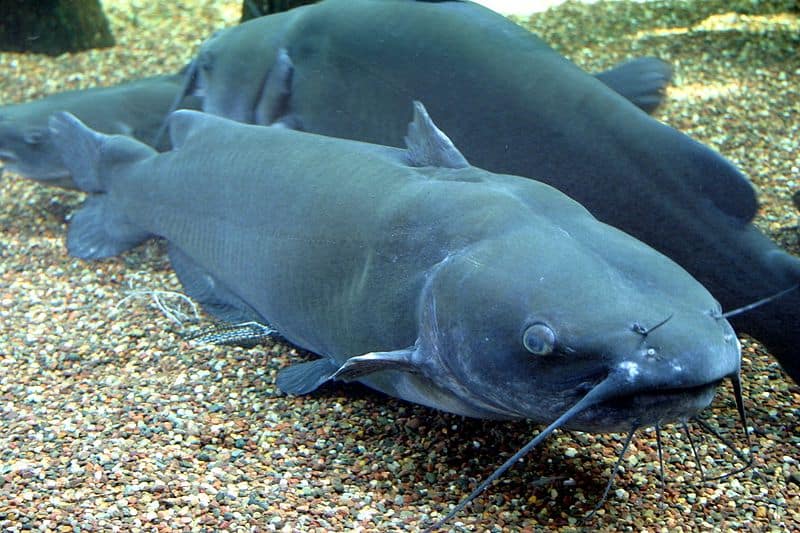
Channel Catfish are one of the 45 species of North American freshwater catfish.
©Ryan Somma, CC BY-SA 2.0, via Wikimedia Commons – License
2. Nurse Shark (Ginglymostoma cirratum)
These sharks are easily distinguished by their wide heads and flattened bodies. In addition, their color varies from yellowish-brown to gray. Furthermore, some juveniles have small dark spots on their bodies, which disappear as they age. Nurse sharks have two broad, rounded dorsal fins and a tail fin. However, unlike other shark species, they do not have a distinct lower lobe. These sharks can grow to a maximum length of 10 feet. But their average length is approximately 5 to 9 feet. The heaviest nurse shark on record weighs a whopping 263.8 pounds!
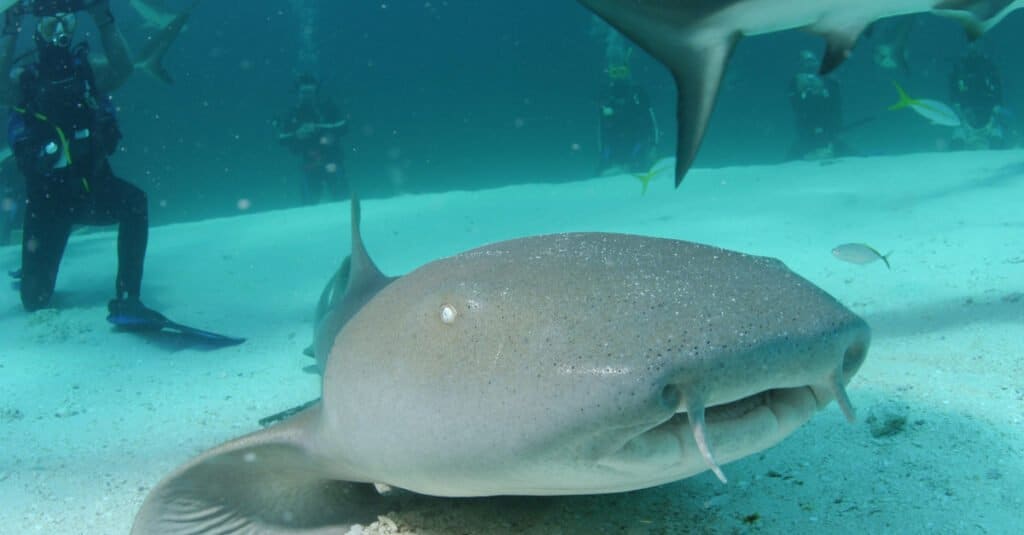
Nurse sharks
have two broad, rounded dorsal fins and a tail fin. However, unlike other shark species, they do not have a distinct lower lobe.
©tali de pablos/Shutterstock.com
3. Narrow-Lined Puffer (Arothron manilensis)
This pufferfish primarily occurs in temperate marine waters of the Central and Western Pacific. They are brown to white with black or yellow lines on their bodies. Furthermore, the base of their pectoral fins is surrounded by a large black dot. Narrow-lined puffers occur in a wide range of habitats, like seagrass beds, mangrove swamps, and reef flats. These puffers are notorious for their unique swimming style, silly personalities, and ability to puff up. However, they are known for not only their puffing capabilities but also the way they blow water onto sand to scare out any potential prey. This is also why their nicknames are blowfish.
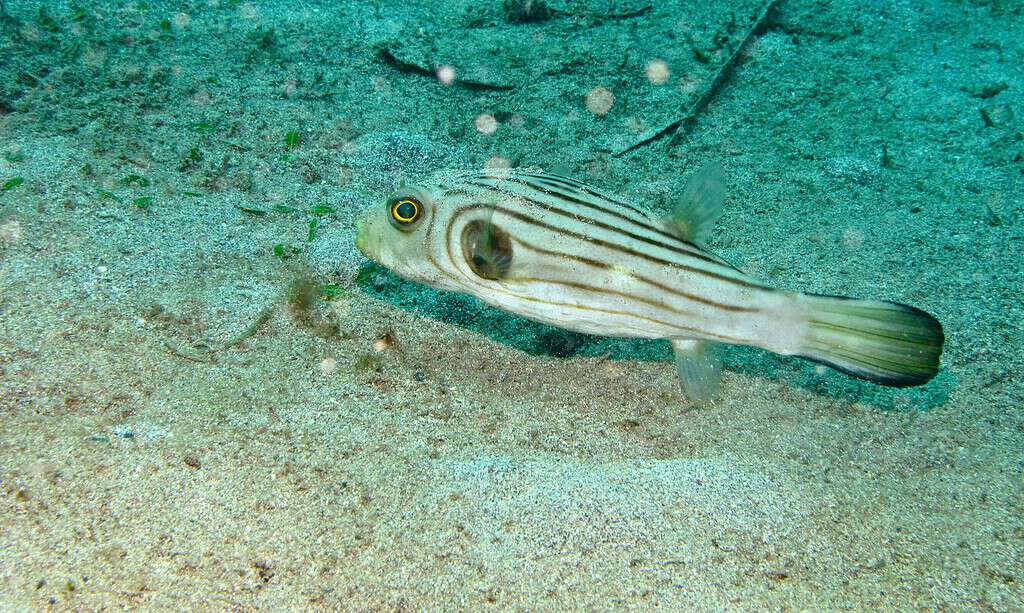
Narrow-lined puffers occur in a wide range of habitats, like seagrass beds, mangrove swamps, and reef flats.
©Bernard DUPONT / CC BY-SA 2.0 – License
4. Neon Tetra (Paracheirodon innesi)
The neon tetra occurs naturally in the tropical regions of northern South America. They inhabit the freshwaters of western Brazil, eastern Peru, south-eastern Colombia, and headwaters of rivers like the Amazon, Yarapa, Tiger, and Napo. Neon tetra occurs in both clearwater and blackwater stream tributaries. However, they are not present in the white water rivers running from the Andes. These fish have bright colors with an iridescent stripe, visible in the dark blackwaters.
Furthermore, neon tetras are in demand amongst aquarists, especially novices. In fact, over 1.5 million neon tetras are imported to the USA monthly! While these fish may be tough to breed for beginners, experienced aquarists can produce immense quantities. As a result, these fish are widely available throughout the world.
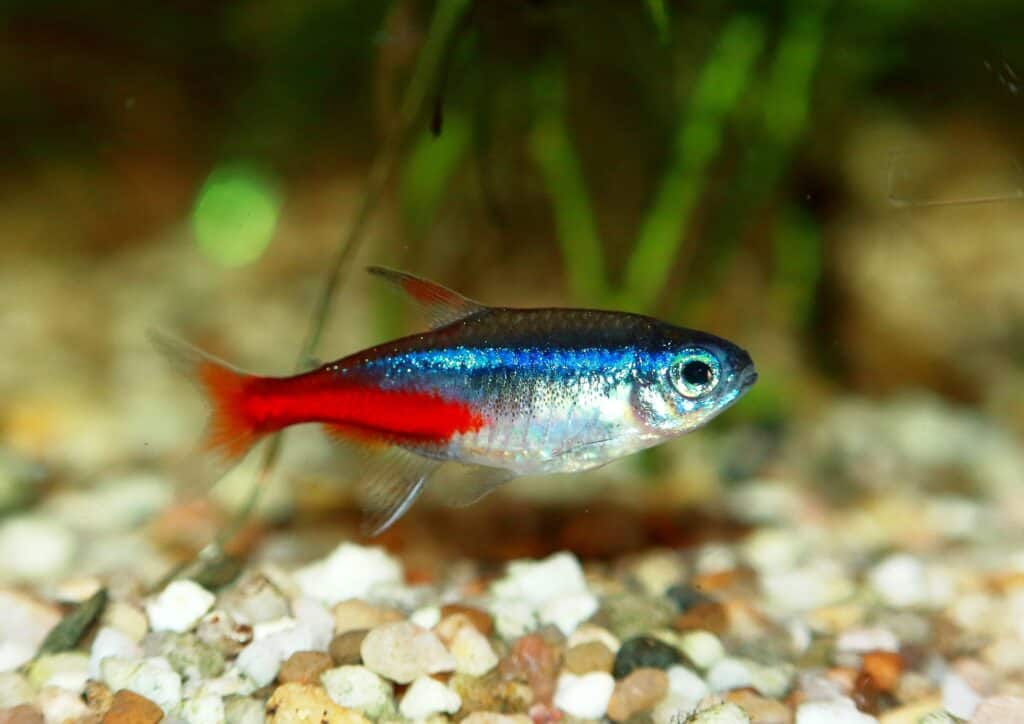
Neon tetra occurs in both clearwater and blackwater stream tributaries.
©Kristiana Berzina/Shutterstock.com
5. Northern River Shark (Glyphis garricki)
The northern river shark occurs in the coastal waters and tidal rivers of Papua New Guinea and Australia. As a result, they are also called the New Guinea river shark. Unfortunately, their numbers are declining due to illegal gillnetting or hook-and-line fishing in the rivers. These sharks have slender teeth and small eyes. In addition, their heads are flat and wide with a long broad, round snout. Therefore, they are often misidentified as bull sharks. Northern river sharks can grow up to 5 feet long and give birth to live young that grow inside the body. These sharks primarily prey on fish and have evolved to inhabit murky waters with poor visibility.
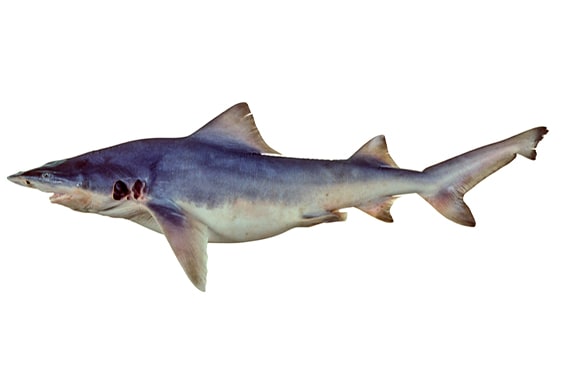
The northern river shark occurs in the coastal waters and tidal rivers of Papua New Guinea and Australia.
©CSIRO National Fish Collection, CC BY 3.0 <https://creativecommons.org/licenses/by/3.0>, via Wikimedia Commons – License
6. Neon Rainbowfish (Melanotaenia praecox)
These beautiful little fish are colorful and love living in large schools. They are quickly becoming a favorite amongst aquarists because of their vibrant colors and easy-going nature. Neon rainbowfish occur in the Mamberamo River Basin in Indonesia and Western New Guinea. Therefore, they are tropical freshwater fish requiring a warmer tank in captivity. These fish are smaller in size, only measuring around three inches long. Males have red fins, while females have yellow fins. However, both genders have pink bodies with large blue eyes.
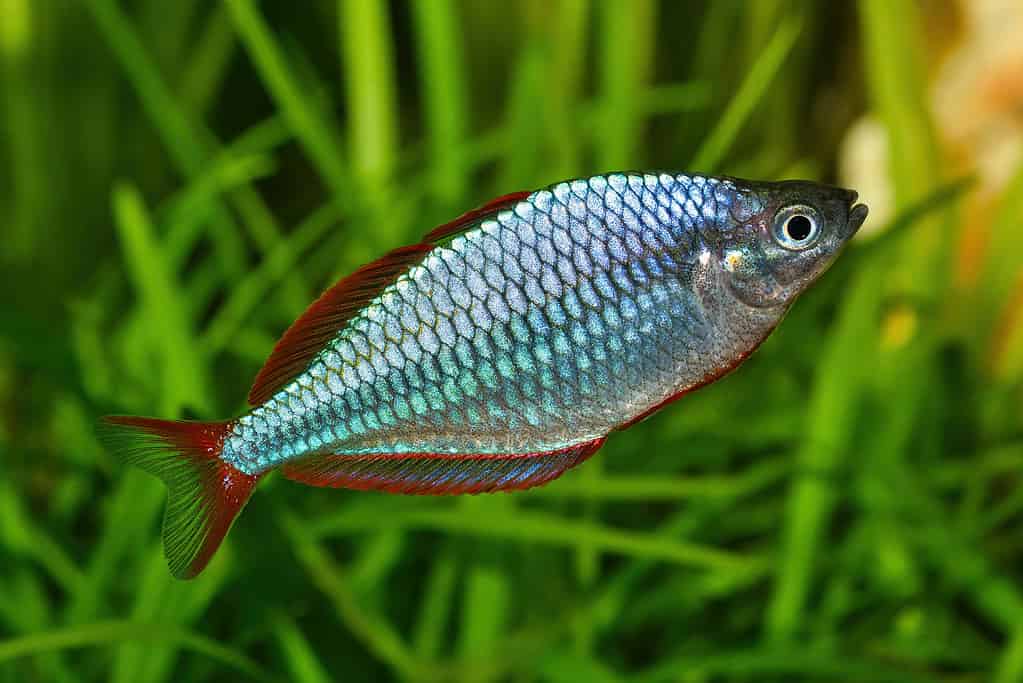
Neon dwarf rainbowfish Melanotaenia praecox in a freshwater aquarium. Neon rainbowfish occur in the Mamberamo River Basin in Indonesia and Western New Guinea.
©iStock.com/NERYX
7. New Guinea Tigerfish (Datnioides (Coius) campbelli)
The New Guinea tigerfish is native to the estuarine waters in New Guinea and rivers surrounding the Gulf of Papua. They occur in both freshwater and brackish waters. Furthermore, they thrive in hard, alkaline freshwater. New Guinea tigerfish is a popular captive species, and aquarists around the world have them in their tanks. However, suppliers warn to house these fish in brackish conditions in captivity, especially the adults. Their diet consists of prawns, shrimp, and chunks of frozen fish. However, some owners provide them with pellets.
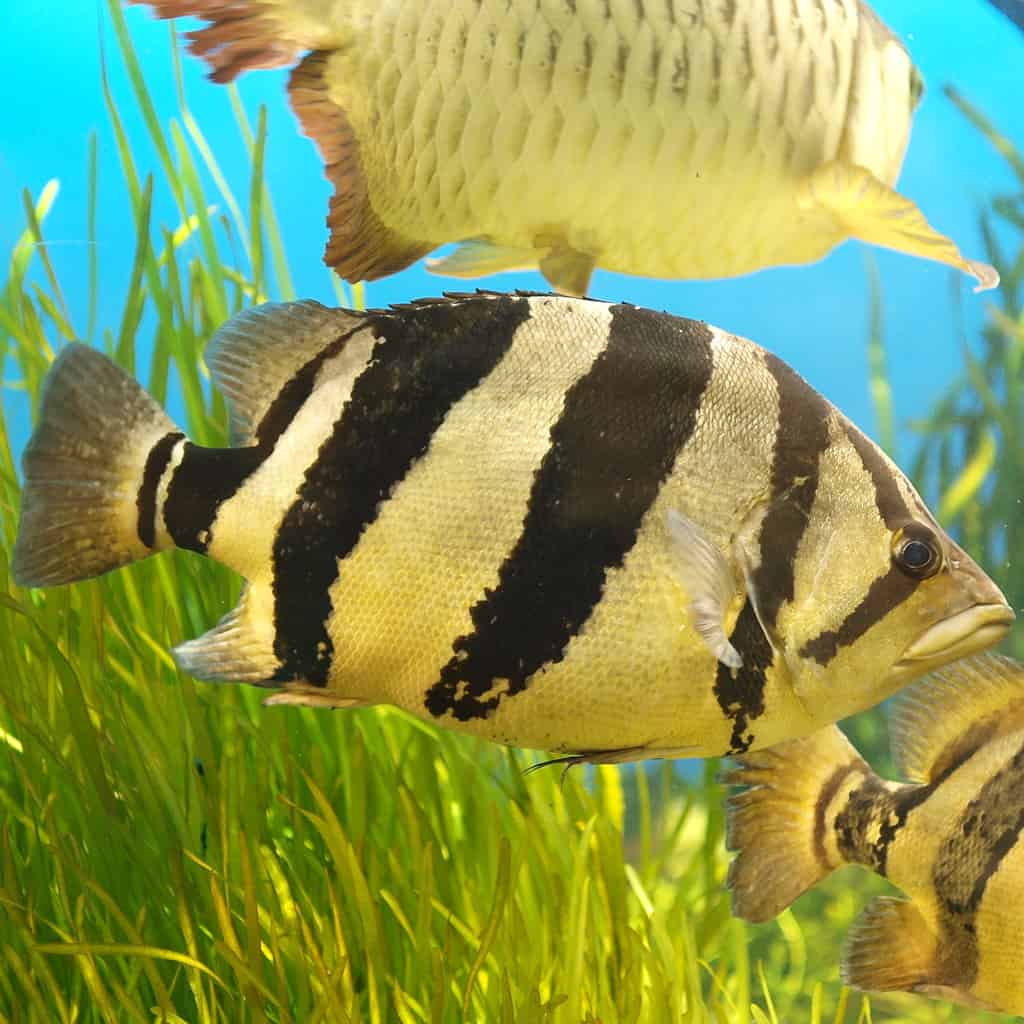
New Guinea tigerfish is a popular captive species, and aquarists around the world have them in their tanks.
©Daiju Azuma / CC BY-SA 2.5 – License
8. Needlefish (Belonidae)
Needlefish often occur on the surface of the open sea or shallow marine habitats. For example, some species inhabit freshwater, marine, and brackish environments, while others are confined to freshwater streams and rivers, like the Xenetodon, Potamorrhaphis, and Belonion. These strange fish closely resemble the North American freshwater gars, who belong to the family Lepisosteidae, as they are long and slender. Additionally, they have narrow jaws filled with tiny sharp teeth. Furthermore, some species of needlefish are called garfish or gars despite being distantly related to true gars.
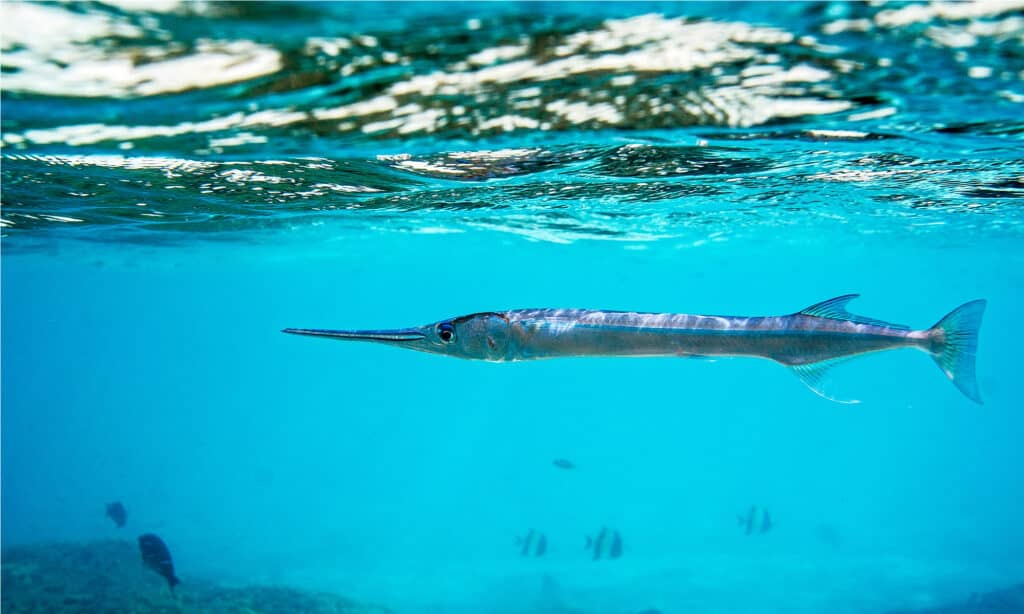
These strange fish closely resemble the North American freshwater gars, who belong to the family Lepisosteidae, as they are long and slender.
©AndrisL/Shutterstock.com
9. Northern Pike (Esox lucius)
The northern pike goes by many names, including:
- Pike
- Great northern pike
- Jack
- Water wolf
These fish are freshwater game fish and the second biggest Esox family member. Northern pike is native to the following areas of North America:
- Canada
- Alaska
- Upper Midwestern United States
However, they are also native to Asia and Northern Europe. Northern pikes are cold-water fish and thrive in deep lakes. Furthermore, they are voracious feeders and require large amounts of food for steady growth. Therefore, if a body of water is overpopulated with these fish, their growth rate is often stunted.
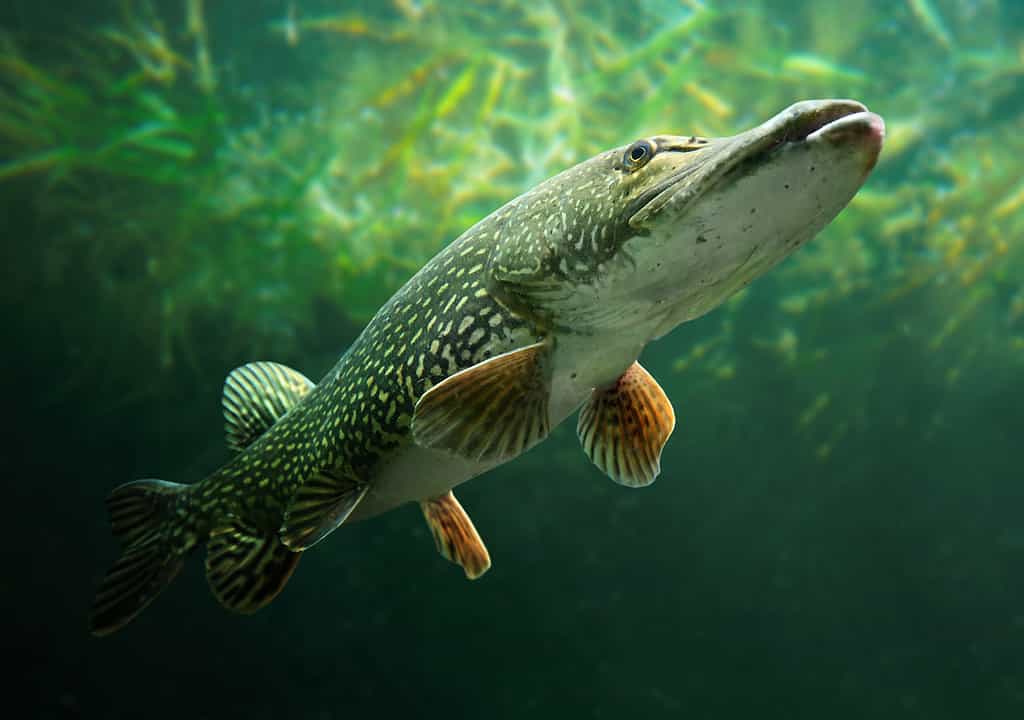
Northern pikes are cold-water fish and thrive in deep lakes.
©iStock.com/abadonian
10. Northern stargazer (Astroscopus guttatus)
The northern stargazer is a funny-looking fish with a blackish-crown body and white spots that get larger from its head to its tail. Their flat bodies can reach lengths of 22 inches. However, they are usually around 8 to 18 inches long. Furthermore, its eyes and mouth sit on top of its large head in an upward direction. In addition, they have three horizontal lines on their tails. Northern stargazers are primarily found at the bottom or lower areas deep in the Chesapeake Bay in the Mid-Atlantic region of the U.S. But, they sometimes migrate to the upper bay in fall. Additionally, northern stargazers inhabit the ranges along the Atlantic Coast between North Carolina and New York.
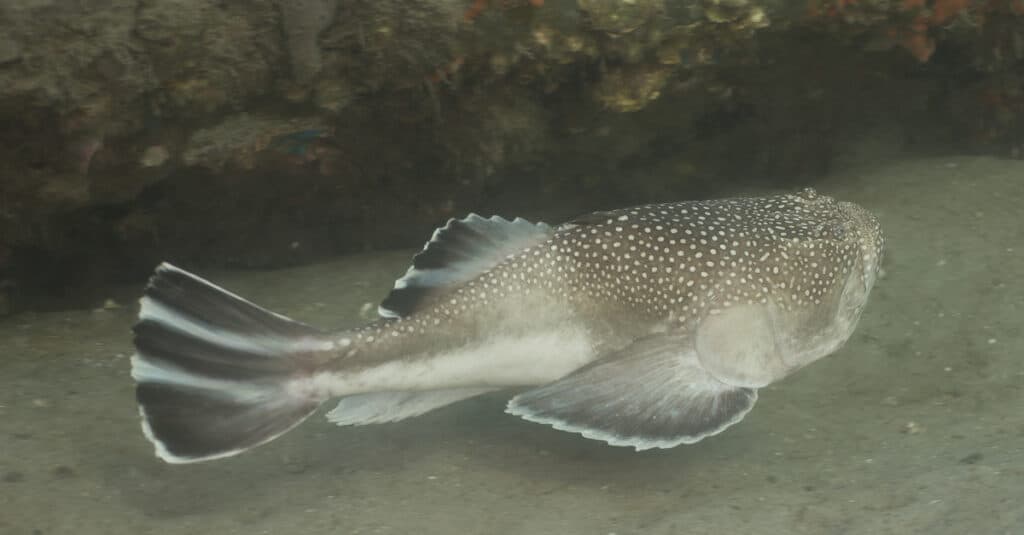
Northern stargazers are primarily found at the bottom or lower areas deep in the Chesapeake Bay in the Mid-Atlantic region of the U.S.
©Peter Leahy/Shutterstock.com
11. Noodlefish (Salanx chinensis)
The noodlefish has a slim and elongated body, which is straight along the stomach and back. In addition, their heads are triangular-shaped from the top. Their bodies are smooth, without scales. However, the males have a thin line of scales near the base of the caudal fin. Noodlefish have a line of black spots along the side of their stomachs, starting from the base of the pectoral fin and ending at the origin of the caudal fin, with white opaque bodies.
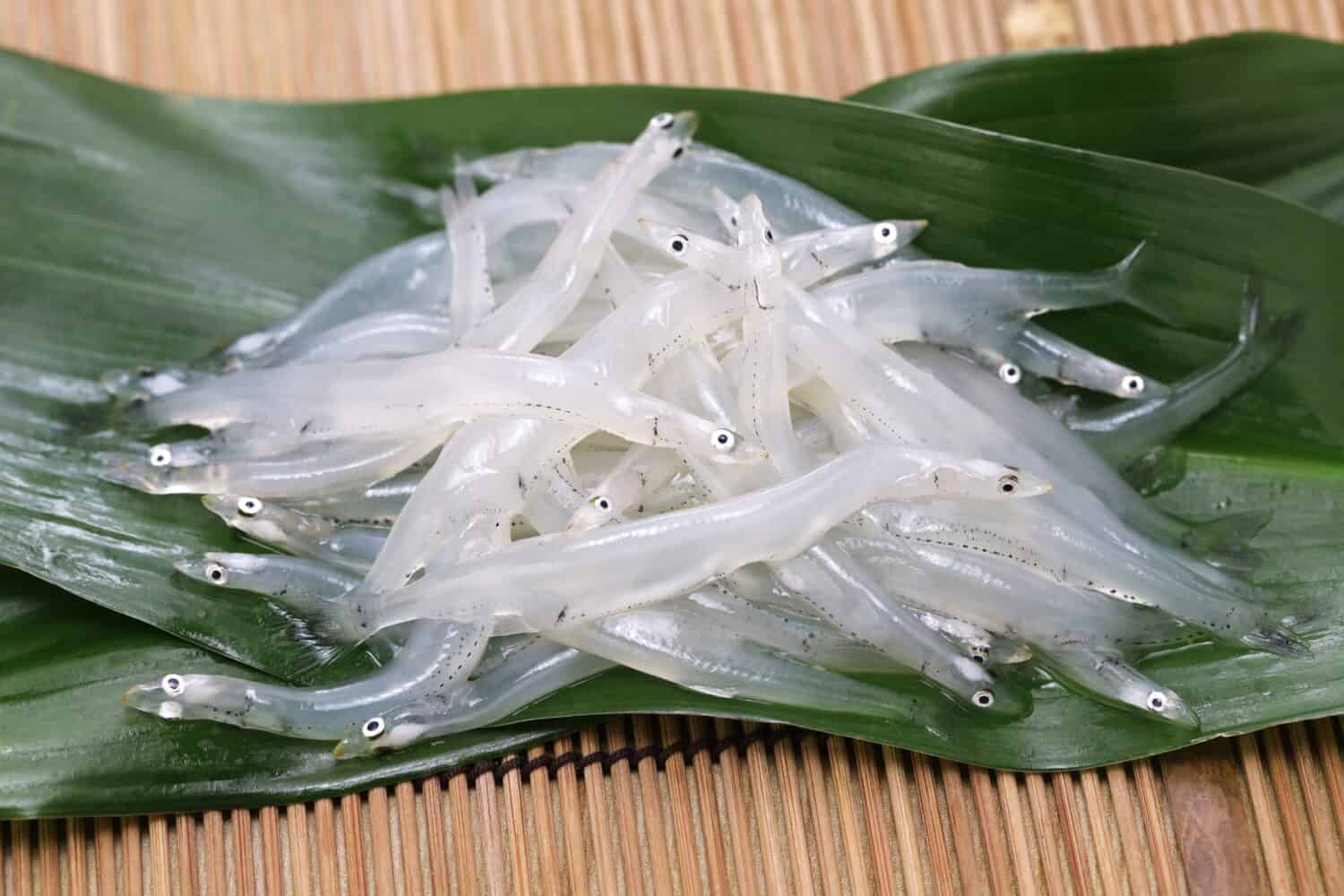
Noodlefish have a line of black spots along the side of their stomachs, starting from the base of the pectoral fin and ending at the origin of the caudal fin, with white opaque bodies. Image: bonchan, Shutterstock
©bonchan/Shutterstock.com
The Largest Fish That Starts with an N
Narwhals are whales that inhabit the cold waters of the Arctic Circle around Greenland and Canada. They can reach lengths of 12 to 20 feet and are similar in size to the Beluga whale. However, male narwhals are easily identifiable by the massive spiraled tooth projecting from their heads. This tooth can measure up to 10 feet long! Male narwhals can grow between 13 to 20 feet long and weigh around 3,500 pounds.
Summary of Fish that Start with an N
| Common Name | Scientific Name |
|---|---|
| North American Freshwater Catfish | Ictalurus furcatus |
| Nurse Shark | Ginglymostoma cirratum |
| Narrow-Lined Puffer | Arothron manilensis |
| Neon Tetra | Paracheirodon innesi |
| Northern River Shark | Glyphis garricki |
| Neon rainbowfish | Melanotaenia praecox |
| New Guinea Tigerfish | Datnioides (Coius) campbelli |
| Needlefish | Belonidae |
| Northern pike | Esox lucius |
| Northern stargazer | Astroscopus guttatus |
| Noodlefish | Salanx chinensis |
The photo featured at the top of this post is © Stevelaycock21 / CC BY-SA 4.0 – License / Original
Thank you for reading! Have some feedback for us? Contact the AZ Animals editorial team.






